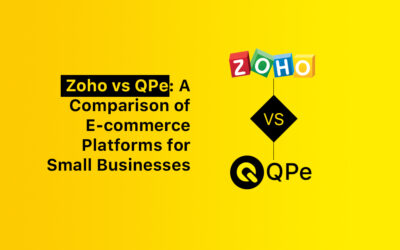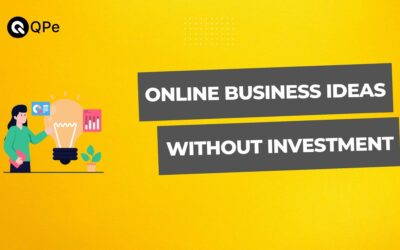The internet has made selling simple! You can now sell to anyone with your own website. You can reach people worldwide. No borders!
However, you need to be more careful as there are a lot of options out there. It’s easy to get lost trying to pick the right platform for your business. That’s why tools like QPe are handy. With QPe, you get everything you need to set up, grow, and scale your brand smoothly.
The best part? You don’t need coding skills to create your store. Qpe helps new brands connect with customers all over.
By using the right tools and taking smart steps, you can speed up your growth and build a solid business.
Follow this guide and figure out the best e-commerce platform in India suitable for your business.
Essential Features To Look For In An E-Commerce Platform
India offers huge opportunities for online brands. With the economy growing fast, you should look to grab all the benefits.
So, if you’re a startup with a product to sell, you can easily get started online with low investment. But before picking the right platform, check out these key features you need in an e-commerce platform:
User Interface And Experience
When you start selling on your e-commerce platform, think like a customer. Ask yourself: Is the User Interface simple? Does it look good? Can anyone easily navigate it?
Make sure the search feature works well. Customers need to browse quickly and find what they want without hassle.
The buying process should be smooth. People should finish in just a few minutes. Also, check how fast the site loads. If it takes more than a few seconds, you might need to rethink using that platform for your products. No one likes waiting.
Scalability Potential For Growing Businesses
Does the platform allow options to scale your business? Are there marketing opportunities and discount options available? Are there special programs for frequent customers activated?
All these questions have to be considered. Because, once the platform where you have agreed to see, should provide you with opportunities to expand your business. Only when there is a scope to maximize profits, can one choose it as the most suitable platform.
Integration Capabilities With Other Tools And Platforms
Businesses need more than just one tool. They need systems that work together smoothly. Relying on one platform doesn’t cut it. You need to link your operations with payment processors, delivery partners, emails, and analytics tools.
Think about a system that easily handles payments. It would make transactions faster for customers. Or, picture sending real-time SMS updates on orders or promos. That boosts engagement. Analytics? They help you track what works and improve on it.
By connecting delivery, payments, email, and ads, you build a system that runs like a well-oiled machine. It’s not just about having tools. It’s about making sure those tools work together for better results.
Good News? QPe can handle endless integrations like these for your online store.
Security Measures For Protecting Customer Information
You need to protect your customers’ personal and payment details. A secure platform does this and builds trust at the same time.
Make sure the platform uses key security features like SSL encryption. This will keep the data safe as it moves between your site and the customers. If the platform handles payments, check that it meets PCI-DSS standards. This keeps payment info protected.
Choose platforms with strong, layered security. Look for two-factor authentication (2FA) to block unauthorized access. Also, check that the platform gets regular security updates to close any gaps hackers might exploit. Backup and recovery features are crucial too in case something goes wrong.
Support For Multiple Payment Gateways
Customers like different ways to pay, and giving them more choices can really improve their shopping experience. Make sure your eCommerce site offers several payment options.
This makes it easier for you to reach more people and cuts down on cart abandonment from limited ways to pay. Simple as that.
How To Choose The Right E-Commerce Platform For Your Business

Alright, now that we’ve nailed down the key factors to look at when choosing an e-commerce platform, let’s dive into the specifics. It’s time to figure out which platform works best for you.
Here’s what to keep in mind before making your final choice:
Identify Your Business Needs And Objectives
Identify the idea behind your business. Zero on your goals and where you see the brand going. Figure out your brand’s mission and values. Also, brainstorm on how you want customers to perceive the brand.
Also, take a peek at your competitors. What are they doing? What gaps do they leave? You need to find something they’re missing.
Your unique value could be anything: maybe you offer better customer service, a product that lasts longer, or maybe it’s more affordable. Stand out with something that matters to your audience, and you’ll win.
Evaluate Cost Against Features
List down the startup costs, such as production, marketing, and equipment. Do an analysis of the financial forecasts for the first few years. Be realistic about expected income.
Also, plan how you will expand in time. Price your products fairly. Make sure your prices cover costs while staying attractive to customers. Factor in the cost of materials, labor, and overhead.
Then, figure out the cost of the platform you wish to sell on. Once that is done, then do an analysis of your business and the features and pricing of the platform. If your analysis turns out to be in green, then it’s a green signal to choose that platform. Otherwise, you might have to consider other options.
E-Commerce Platforms In India For Online Sellers – Ranked
With so many e-commerce platforms available, it can be tough to decide which one suits your needs. To help you out, we’ve ranked the best e-commerce platforms in India.
QPe

Looking to launch an online store without the hassle? QPe makes it easy for everyone including a beginner or a seasoned pro.
Here’s what QPe can do for you:
Quick Store Setup Launch your store in minutes. No coding. Set up your domain, add products, customize the look, and go live fast.
Stylish Themes Choose from over 100 themes built for sales and SEO. Want something unique? Get a custom theme.
Data-Driven Insights Track sales and customer behavior with easy-to-read reports. Make decisions backed by data.
Sell Everywhere Sell on your website, social media, and marketplaces. Use the POS system for in-store sales too.
Marketing Support
- SEO tools for higher search rankings
- Social media integration
- Automated chatbots to engage customers
Customer-Focused Features
- Recover lost sales with abandoned cart reminders.
- Offer wishlists and loyalty points to keep customers coming back.
Simple Product Management Adding and updating products is a breeze. Use filters to help customers find what they need. Manage orders and inventory with zero hassle.
Global Reach Accept multiple currencies. Offer support in different languages. Handle international taxes without stress.
Save on Tech Costs QPE is an all-in-one solution that helps you cut costs and grow profits.
Start your store with QPe today. It’s fast, easy, and gives you the tools to succeed. Ready to sell without limits? Build your store now!
Shopify
Shopify offers some nice designs and handy tools for selling online. They even have thousands of apps to boost your store’s features. But here’s the thing, those costs can stack up quickly.
Between the monthly fees and adding apps, you might find yourself spending more than you expected so be mindful here.
Shift4Shop
Shift4Shop also has a good website builder that helps retailers to sell online. Abandoned cart notifications are provided to recover potential sales. However, their customization capability is limited. Thus, those sellers looking to only sell and not create a brand through customization can sell through Shift4Shop.
Square Online
Square Online is an ideal platform to use if you have no investment option possible. You can build a website for free. However, you will need to upgrade to a paid plan to remove ads and also do certain customization. Square Online also integrates with Square POS for streamlined in-store payment processing.
Squarespace
Squarespace begins with a template that can be customized according to your tastes and colors. It has the capability to adjust the designs as per the size of the screen, making it very responsive.
BigCommerce
BigCommerce caters to large-scale businesses and offers web hosting and extensive site customization. BigCommerce is equipped for international sales, SEO optimization, and multichannel selling across social platforms and online marketplaces.
Wix
Wix offers a non-technical website builder to create online stores. Users can build an e-commerce website using the drag-and-drop builder for free. However, to use other customizable features, the plan needs to be upgraded. Also provides essential tools for managing your e-commerce business, including order tracking, online payment acceptance, and multichannel selling.
GoDaddy
GoDaddy is widely recognized for its web hosting services but also offers a capable website builder for online stores. It’s a good fit for those looking to integrate e-commerce into a broader digital presence. It simplifies online store creation with more than 100 mobile-friendly templates, including providing for SEO and email marketing campaigns.
WooCommerce
WooCommerce is a plug-in for WordPress users, transforming any WordPress site into a functional e-commerce store. It’s best for those who already have the technical capability to use a WordPress website. WooCommerce integrates deeply with WordPress, offering extensive features for inventory management, secure payments, and shipping. Its functionality can be expanded with numerous plug-ins and themes available for purchase.
Magento
Magento platform offers a robust shopping cart system. It seamlessly interfaces with multiple payment options, ensuring a smooth checkout process for customers. Magento also helps in strategic decision-making through its extensive product and customer information repository.
Marketing Strategies For E-Commerce Success In India
Selling and marketing go hand-in-hand. Let’s brainstorm on the marketing strategies one must undertake to sell successfully.
Leverage Social Media For Brand Visibility
Use social media to share your brand’s style and connect with followers. This helps build your audience and showcase your products. Post real-life photos from customers who use your products as it feels more genuine. Partner with micro-influencers who share your brand values.
User-generated content adds authenticity to your brand and encourages others to share. Repost a customer’s video on Instagram with the caption.
Feature customer selfies on your website’s homepage to show real people enjoying your products. Create a monthly post to highlight loyal customers and encourage others to participate.
Optimize For E-Commerce SEO
The internet has billions of websites, but crawlers can’t track them all. That’s where SEO comes in. SEO stands for Search Engine Optimization. Experts use different strategies to rank websites higher on search engines. This boosts traffic and leads to more sales.
So, find a good SEO provider. It helps you reach more customers.
Use Email Marketing for Personalized Promotions
Email marketing helps you keep your audience informed and engaged. It’s great for sharing news and special deals. Send a “Welcome Email” to new subscribers with a discount for their first purchase.
Share emails when a sale is ending soon. It encourages quick action. Feature customer stories in your newsletter to add a personal touch.
Conclusion
Online selling platforms in India open up tons of opportunities for sellers. You can sell almost anything online. All you need is a laptop and a solid internet connection. The best part? You don’t need tech skills, coding know-how, or a big budget for a website.
So, with plenty of options out there, pick an easy-to-use and affordable ecommerce platform like QPe, get listed, and start selling.
Frequently Asked Questions (FAQs):
Which E-Commerce Platform Is Best For Small Businesses In India?
Find a platform known for good service, ease of use, popularity, and also pertaining to your industry. Ask for reviews to check their work before you decide. Compare prices, and delivery times to pick the best one.
How Do I Start An E-Commerce Business In India?
Basis the steps mentioned in this blog, you can start an online business now. Invest in a good online selling platform, and then start selling.
To promote, start with a blog or a video. The world is your ocean. Explore!
What Are The Legal Requirements For Starting An E-Commerce Site In India?
The legal requirements for starting an E-Commerce website in India are as follows:
- Register your company
- Get a GST Registration certificate
- Open a company bank account
- Get access to the payment gateway
- Ensure all the legal compliances of the business are in place



